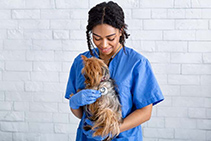
It is helpful to know what to expect when you take your pet to a veterinarian. General vet visits can help your pet live a healthy, happy, and long life. Regular veterinary examinations can detect emerging health issues and are essential to extending your pet’s life.
Early diagnosis and intervention allow your vet to treat a health condition in its early stages or manage it with medication or lifestyle changes. During a general vet visit, you will receive pointers to help your furry friend live the healthiest life possible and avoid potential detrimental medical conditions.
Why a General Vet Visit Is Important
Wellness veterinary checkups are critical to your pet’s health and well-being. They allow your vet a chance to monitor your pet’s health and check for early signs of illness. Even if your pet looks healthy, veterinarians recommend regular wellness exams to monitor their health as they age.
Additionally, general vet visits allow veterinarians to obtain a baseline on their patients’ medical status in preparation for when they sustain an injury or fall sick. They also check for diseases that are difficult to detect early, such as kidney disease, heart disease, or cancers. Such conditions can benefit from early treatment.
What to Expect During Your Visit
General vet visits, also known as routine pet wellness exams, are your pet’s best opportunity to achieve a high-quality life. What happens during the visits that makes them so important for pets?
Meeting With the Pet Parent
The first thing the vet will do during your visit is to ask you questions about your pet. The vet will want to know about any changes in your pet’s drinking or eating habits, behavior, and other concerns such as:
Diarrhea
Vomiting
Sneezing
Coughing
Weight loss or gain
Scratching
Problems with balance
Difficulty getting around
Limping/lameness
Excessive panting, and more
Vital Signs
Your veterinarian or a veterinary technician will take your pet’s vital signs, including weight, temperature, respiration rate, and pulse. Significant changes in any of these may indicate medical issues that require treatment. The vet will also compare past records with current measurements to determine the appropriate diagnostic tests to conduct now or in the future.
Physical Checkup
Your veterinarian will perform a routine physical exam during your general visit. The physical often begins with a head-to-toe inspection, examining the joints, legs, and feet and checking the abdominal area for pain and swollen organs. The vet will also examine your pet’s reproductive organs, eyes, mouth, and ears for common symptoms that appear in these areas. Veterinarians use a stethoscope to check heart and lung sounds. If your furry friend suffers from a specific problem, your veterinarian will perform a more targeted exam and additional tests may be required.
Pet Vaccinations
Your vet will use these visits to confirm your pet is current on all vaccinations to protect your pet’s health and prevent the spread of communicable diseases. Your pet might receive shots during the visit to immunize him/her against various contagious diseases.
Veterinarians understand specific health conditions that are common in certain breeds. Your vet will keep an eye out for specific and general problems that might pop up throughout your pet’s life.
Lab Work
For dogs, heartworm and fecal testing are recommended annually to make sure they are parasite free. Fecal testing is recommended annually for outdoor cats. Routine blood work is also recommended yearly for both dogs and cats. Especially as our pets age, blood work is necessary to ensure good health and look at organ function.
For more pet care tips, contact True Animal Vet at our office in The Woodlands, Texas. Contact us to schedule an appointment when we open early 2023.
Dr. Lindsay Nicholson
Chief Medical Officer
True Animal Vet










